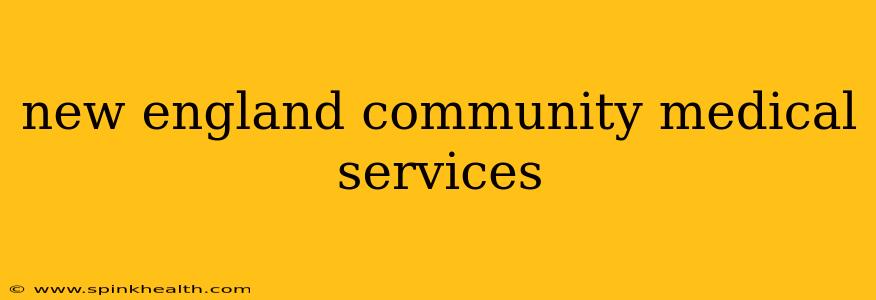Finding the right healthcare provider can feel like navigating a maze, especially in a region as diverse as New England. This isn't just about finding a doctor; it's about finding a healthcare system that aligns with your needs, values, and access requirements. This guide delves into the world of community medical services in New England, offering a clearer path to understanding and accessing the care you deserve.
My name is Dr. Evelyn Reed, and I've spent over 20 years working within various New England community healthcare organizations. I understand firsthand the unique challenges and opportunities presented by this system. This post is born from that experience, aiming to demystify the process and empower you to make informed decisions about your healthcare.
What are Community Medical Services in New England?
Community medical services encompass a wide range of healthcare providers and facilities dedicated to serving the diverse populations across New England's six states – Maine, Vermont, New Hampshire, Massachusetts, Rhode Island, and Connecticut. These aren't just your large hospital networks; they also include smaller, local clinics, community health centers, and specialized services tailored to specific communities' needs. The unifying characteristic? A focus on accessibility and comprehensive care, often targeting underserved populations. Think of them as the backbone of accessible healthcare in the region.
What types of services do New England community medical centers offer?
New England community medical services are remarkably diverse. The specific services offered vary between organizations but typically include:
- Primary Care: This is your entry point into the system, providing routine checkups, vaccinations, and management of chronic conditions.
- Specialty Care: From cardiology and oncology to pediatrics and mental health, specialized services often exist within or are affiliated with community medical centers.
- Preventive Care: Many focus on preventative measures like screenings, health education, and wellness programs, aiming to keep you healthy before problems arise.
- Dental and Vision Care: Access to these services is crucial, and many community medical centers integrate them into their comprehensive approach.
- Behavioral Health Services: Mental health and substance abuse treatment are increasingly integrated into community care, recognizing their vital importance to overall wellbeing.
How do I find a community medical center near me?
Finding the right community medical center involves several steps. Firstly, consider your location and insurance coverage. Most states have online directories of healthcare providers, making it easy to filter by location, specialty, and insurance acceptance.
Secondly, consider the specific services you need. Do you require specialized care, or are you mainly looking for primary care? Each center has its own strengths, so research is key. Reading online reviews and checking accreditation status can also provide valuable insight.
Finally, don't hesitate to reach out directly to the centers. Most have websites with contact information and often offer virtual consultations or phone calls to answer your questions.
What are the benefits of using community medical services?
Many find that community medical services offer several key advantages:
- Accessibility: These centers often operate in locations convenient to underserved populations, addressing geographical barriers.
- Affordability: Many offer sliding-scale fees based on income, ensuring access for those with limited financial resources.
- Holistic Care: The focus on preventive care and integrated services leads to more comprehensive and proactive health management.
- Community Focus: These centers often build strong relationships within their communities, creating a personalized and supportive care environment.
Are community medical centers only for low-income individuals?
No. While community health centers often serve low-income populations, their services are available to everyone. The focus on access and affordability makes them a valuable resource for a broad range of individuals, regardless of income.
What is the difference between a community health center and a hospital?
Community health centers primarily provide primary and preventative care, often with integrated specialty services. Hospitals, on the other hand, offer a wider range of acute and emergency care services, typically including inpatient hospital stays and advanced medical procedures. Community health centers can often refer patients to hospitals when needed, working collaboratively within the larger healthcare ecosystem.
Navigating the healthcare system can feel daunting, but with a bit of research and a clear understanding of the resources available, finding the right fit in New England’s diverse community medical landscape is achievable. Remember to utilize online resources, reach out to centers directly, and prioritize your specific needs when making your choice. Your health journey is unique, and finding the right community medical services partner is a crucial step in ensuring positive outcomes.

